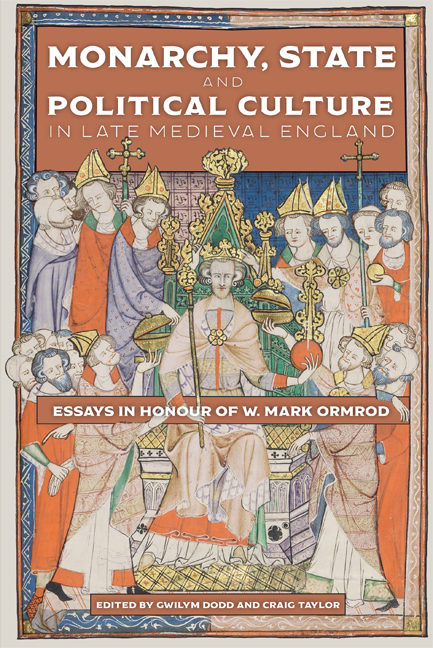Book contents
- Frontmatter
- Contents
- Frontispiece
- Preface and Acknowledgements
- Contributors
- Abbreviations
- Professor W. Mark Ormrod: A Personal Appreciation
- 1 The ‘Unfortunate’ Fraudster: Thomas de Boulton and the East Riding Lay Subsidy of 1332
- 2 Negotiating and Creating Collegiate Statutes in the Fourteenth Century
- 3 An Emotional Pragmatism: Edward III and Death
- 4 Defaming the King: Reporting Disloyal Speech in Fourteenth-Century England
- 5 Law and Arms: The Politics of Chivalry in Late Medieval England
- 6 ‘Nother by Addicions, Nother by Diminucions’: The Parliament of April 1414 and the Drafting of Late Medieval English Legislation
- 7 The Medieval ‘Side-Hustler’: Thomas Hoccleve’s Career in, and out of, the Privy Seal
- 8 The Order, Rules and Constructions of the House of the Most Excellent Princess Cecily, Duchess of York
- 9 Archbishops’ Registers Revealed: Church, State and Society in the Registers of the Archbishops of York, 1225–c.1650
- List of PhD Supervisees
- List of Grants
- Index
- Tabula Gratulatoria
2 - Negotiating and Creating Collegiate Statutes in the Fourteenth Century
Published online by Cambridge University Press: 06 October 2020
- Frontmatter
- Contents
- Frontispiece
- Preface and Acknowledgements
- Contributors
- Abbreviations
- Professor W. Mark Ormrod: A Personal Appreciation
- 1 The ‘Unfortunate’ Fraudster: Thomas de Boulton and the East Riding Lay Subsidy of 1332
- 2 Negotiating and Creating Collegiate Statutes in the Fourteenth Century
- 3 An Emotional Pragmatism: Edward III and Death
- 4 Defaming the King: Reporting Disloyal Speech in Fourteenth-Century England
- 5 Law and Arms: The Politics of Chivalry in Late Medieval England
- 6 ‘Nother by Addicions, Nother by Diminucions’: The Parliament of April 1414 and the Drafting of Late Medieval English Legislation
- 7 The Medieval ‘Side-Hustler’: Thomas Hoccleve’s Career in, and out of, the Privy Seal
- 8 The Order, Rules and Constructions of the House of the Most Excellent Princess Cecily, Duchess of York
- 9 Archbishops’ Registers Revealed: Church, State and Society in the Registers of the Archbishops of York, 1225–c.1650
- List of PhD Supervisees
- List of Grants
- Index
- Tabula Gratulatoria
Summary
STATUTES ARE USUALLY TAKEN for granted as one of the definitional features of medieval, and indeed modern, collegiate life. As a form of document, however, they emerged in response to particular constraints in the late thirteenth century and were widely taken up in the mid-fourteenth century. This type of document was important to their institutions, and often remained in use until dissolution, or, in the case of the English cathedrals, until modern renegotiations. For this reason they have often been used as descriptions of what life in a medieval college was like. They have also been used as a basis for categorising institutions. In making such categorisations, historians have followed the pioneering work of Alexander Hamilton Thompson from the first decades of the twentieth century. He used collegiate statutes as a class of document displaying what collegiate life as a whole could be, and to divide colleges into two types: chantry colleges and older institutions in the ‘cathedral model’. The key difference between chantry colleges and colleges following the cathedral model was the differing expectation of residence set out in their respective regulations. Finally, statutes have more recently been seen as proscriptive and regulatory texts that were part of founders’ efforts to ensure accountability and good management by the community.
This essay comes out of a conversation with Mark Ormrod in the early months of my doctoral work, as part of a discussion about a fragment of the almost entirely lost statutes of St Stephen's College, Westminster, from 1355. He asked me ‘what were medieval statutes?’ Part of the answer emerged in a reconstruction of what might have been included in the statutes of St Stephen's using the provisions in the statutes surviving from large royal and noble foundations in the fourteenth and fifteenth centuries. This essay extends that assessment by discussing how statutes became the standard and routine definitional document in the lives of collegiate communities after 1340, when colleges began to be a popular form of lay foundation, and how statutes subsequently became an expected and ubiquitous part of the collegiate foundation process in the fifteenth century.
- Type
- Chapter
- Information
- Monarchy, State and Political Culture in Late Medieval EnglandEssays in Honour of W. Mark Ormrod, pp. 21 - 38Publisher: Boydell & BrewerPrint publication year: 2020

